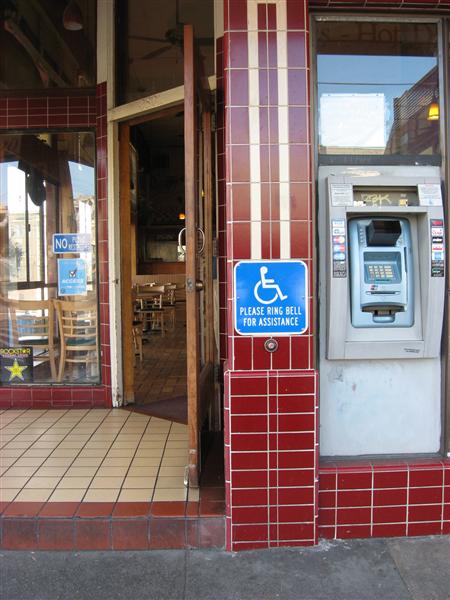mark handler
SAWHORSE
Rising Number of Disability Lawsuits
By Corrie M. Anders
http://www.noevalleyvoice.com/2012/March/ADA.htm

Happy Donuts now has a sign and a bell beneath it, which will summon clerks from inside the shop. Photo by Sally Smith
The number of Noe Valley merchants caught up in a wave of disability lawsuits has risen sharply—even as shops seek to mitigate complaints they discriminate against customers with physical handicaps.
At least 23 local businesses have been sued or threatened with lawsuits over the past year, according to Robert Roddick, president of the Noe Valley Merchants and Professionals Association.
Some businesses that received warning letters from disabled customers took remedial steps and were not sued, Roddick said. Others ignored the letters and were hit with lawsuits, he said, while several merchants that were sued settled out of court.
Happy Donuts, which has a steep entry step that obstructs wheelchair access to the 24th Street store, settled recently after agreeing to provide “curbside service” to shoppers with disabilities, according to the store’s attorney, Ragi Dindial of Noe Valley. The step was too high for either a permanent or a temporary ramp, Dindial said. Instead, Happy Donuts agreed to post a clearly visible sign directing patrons to a bell that would alert sales clerks, who would go outside to take their orders. The financial terms were confidential.
Starting in late 2010, commercial tenants and landlords began receiving letters notifying them that their businesses and properties appeared to violate the federal Americans with Disabilities Act (ADA) and California’s Unruh Civil Rights Act. (See “Flurry of Letters Spurs Shops to Improve Access for Disabled,” February 2011 Voice.) Since then, merchants have been meeting with city officials and ADA experts and working on various legislative proposals.
Roddick said a committee headed by Gwen Sanderson of Video Wave, who is among those who have been sued, Susan Walia of Castro Computer Services, and Michael Onufer of Rockwell Properties last month completed an analysis of the local ADA picture and submitted a report to Sen. Dianne Feinstein.
In the document, the committee said Noe Valley merchants faced high financial outlays in their efforts to remedy complaints. For example, the report said the range of costs for “access implementation,” other than simple ramps, was $12,000 to $90,000. The average cost of settling a lawsuit out of court was listed as $24,000.
The merchants group asked Feinstein to support U.S. House Bill 881, which would give businesses and landlords a grace period of 90 days in which to comply with ADA statutes before they could be sued.
The committee also wants city officials to notify businesses and landlords about ADA issues during remodeling or renovation projects.
In addition, the merchants group wants property owners to make a full disclosure, before a lease is signed or renewed, stating whether their location is in compliance with ADA laws.
By Corrie M. Anders
http://www.noevalleyvoice.com/2012/March/ADA.htm

Happy Donuts now has a sign and a bell beneath it, which will summon clerks from inside the shop. Photo by Sally Smith
The number of Noe Valley merchants caught up in a wave of disability lawsuits has risen sharply—even as shops seek to mitigate complaints they discriminate against customers with physical handicaps.
At least 23 local businesses have been sued or threatened with lawsuits over the past year, according to Robert Roddick, president of the Noe Valley Merchants and Professionals Association.
Some businesses that received warning letters from disabled customers took remedial steps and were not sued, Roddick said. Others ignored the letters and were hit with lawsuits, he said, while several merchants that were sued settled out of court.
Happy Donuts, which has a steep entry step that obstructs wheelchair access to the 24th Street store, settled recently after agreeing to provide “curbside service” to shoppers with disabilities, according to the store’s attorney, Ragi Dindial of Noe Valley. The step was too high for either a permanent or a temporary ramp, Dindial said. Instead, Happy Donuts agreed to post a clearly visible sign directing patrons to a bell that would alert sales clerks, who would go outside to take their orders. The financial terms were confidential.
Starting in late 2010, commercial tenants and landlords began receiving letters notifying them that their businesses and properties appeared to violate the federal Americans with Disabilities Act (ADA) and California’s Unruh Civil Rights Act. (See “Flurry of Letters Spurs Shops to Improve Access for Disabled,” February 2011 Voice.) Since then, merchants have been meeting with city officials and ADA experts and working on various legislative proposals.
Roddick said a committee headed by Gwen Sanderson of Video Wave, who is among those who have been sued, Susan Walia of Castro Computer Services, and Michael Onufer of Rockwell Properties last month completed an analysis of the local ADA picture and submitted a report to Sen. Dianne Feinstein.
In the document, the committee said Noe Valley merchants faced high financial outlays in their efforts to remedy complaints. For example, the report said the range of costs for “access implementation,” other than simple ramps, was $12,000 to $90,000. The average cost of settling a lawsuit out of court was listed as $24,000.
The merchants group asked Feinstein to support U.S. House Bill 881, which would give businesses and landlords a grace period of 90 days in which to comply with ADA statutes before they could be sued.
The committee also wants city officials to notify businesses and landlords about ADA issues during remodeling or renovation projects.
In addition, the merchants group wants property owners to make a full disclosure, before a lease is signed or renewed, stating whether their location is in compliance with ADA laws.
